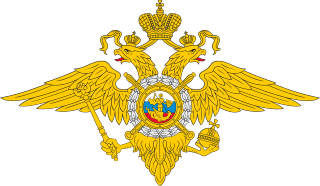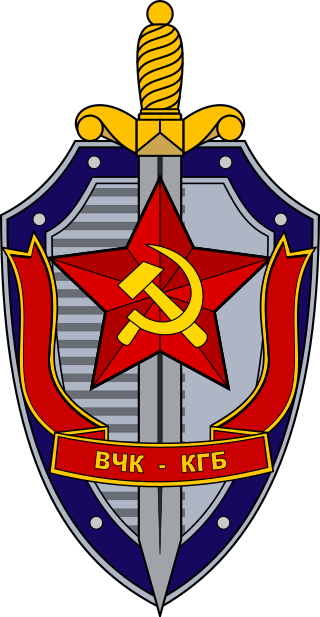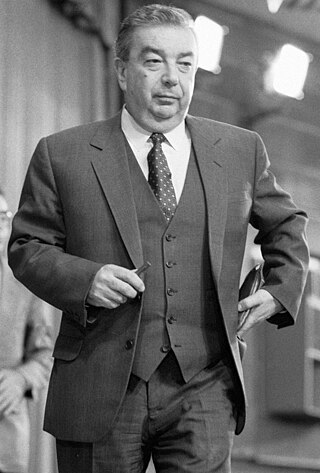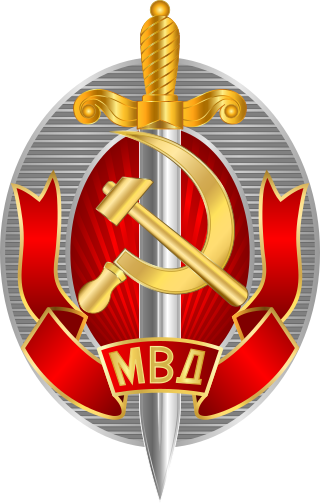Committee for State Security may refer to:
CSS, or Cascading Style Sheets, is a language used to describe the style of document presentations in web development.
FSB may refer to:

The Ministry of Internal Affairs of the Russian Federation is the interior ministry of Russia.

An index of articles related to the former nation known as the Soviet Union. It covers the Soviet revolutionary period until the dissolution of the Soviet Union. This list includes topics, events, persons and other items of national significance within the Soviet Union. It does not include places within the Soviet Union, unless the place is associated with an event of national significance. This index also does not contain items related to Soviet Military History.

The Security Service of Ukraine or SBU is the law enforcement authority and main intelligence and security agency of the Ukrainian government, in the areas of counter-intelligence activity and combating organized crime and terrorism. The Constitution of Ukraine defines the SBU as a military formation, and its staff are considered military personnel with ranks. It is subordinated directly under the authority of the president of Ukraine. The SBU also operates its own special forces unit, the Alpha Group.

Active measures is a term used to describe political warfare conducted by the Soviet Union and the Russian Federation. The term, which dates back the 1920's, includes operations such as espionage, propaganda, sabotage and assassination, based on foreign policy objectives of the Soviet and Russian governments. Active measures have continued to be used by the administration of Vladimir Putin.

The First Main Directorateof the Committee for State Security under the USSR council of ministers was the organization responsible for foreign operations and intelligence activities by providing for the training and management of covert agents, intelligence collection administration, and the acquisition of foreign and domestic political, scientific and technical intelligence for the Soviet Union. The First Chief Directorate was formed within the KGB directorate in 1954, and after the collapse of the Soviet Union became the Foreign Intelligence Service. The primary foreign intelligence service in Russia and the Soviet Union has been the GRU, a military intelligence organization and special operations force.
There were a succession of Soviet secret police agencies over time. The first secret police after the October Revolution, created by Vladimir Lenin's decree on December 20, 1917, was called "Cheka" (ЧК). Officers were referred to as "chekists", a name that is still informally applied to people under the Federal Security Service of Russia, the KGB's successor in Russia after the dissolution of the Soviet Union.
Oleg Danilovich Kalugin is a former KGB general. He was during a time, head of KGB political operations in the United States and later a critic of the agency. After being convicted of spying for the West in absentia during a trial in Moscow, he remained in the US and was sworn in as a citizen on 4 August 2003.
Ministry for State Security or Ministry of State Security may refer to:

Vladimir is a masculine given name of Slavic origin, widespread throughout all Slavic nations in different forms and spellings. The earliest record of a person with the name is knyaz Vladimir of Bulgaria.

The State Security Committee of the Republic of Belarus is the national intelligence agency of Belarus. Along with its counterparts in Transnistria and South Ossetia, it kept the unreformed name after declaring independence.

State Security was the name of the Bulgarian secret service under the People's Republic of Bulgaria during the Cold War, until 1989. State Security was closely allied with its Soviet counterpart, the KGB.
USSR most commonly refers to the Soviet Union.

The Committee for State Security was the main security agency for the Soviet Union from 13 March 1954 until 3 December 1991. As a direct successor of preceding agencies such as the Cheka, GPU, OGPU, NKGB, NKVD and MGB, it was attached to the Council of Ministers. It was the chief government agency of "union-republican jurisdiction", carrying out internal security, foreign intelligence, counter-intelligence and secret police functions. Similar agencies operated in each of the republics of the Soviet Union aside from the Russian SFSR, where the KGB was headquartered, with many associated ministries, state committees and state commissions.

Operation INFEKTION was an active measure disinformation campaign run by the KGB in the 1980s to plant the idea that the United States had invented HIV/AIDS as part of a biological weapons research project at Fort Detrick, Maryland. Historian Thomas Boghardt popularized the codename "INFEKTION" based on the claims of former East German Ministry for State Security (Stasi) officer Günter Bohnsack, who claimed that the Stasi codename for the campaign was either "INFEKTION" or perhaps also "VORWÄRTS II". However, historians Christopher Nehring and Douglas Selvage found in the former Stasi and Bulgarian State Security archives materials that prove the actual Stasi codename for the AIDS disinformation campaign was Operation DENVER. The operation involved "an extraordinary amount of effort — funding radio programs, courting journalists, distributing would-be scientific studies", according to journalist Joshua Yaffa, and even became the subject of a report by Dan Rather on the CBS Evening News.

The Ministry of Internal Affairs of the USSR was the interior ministry of the Soviet Union from 1946 to 1991.

The KGB of the Ukrainian SSR was a state committee of the Ukrainian Soviet Socialist Republic and a regional predecessor of the Security Service of Ukraine, a republican part of All-Union Committee for State Security. After the adaptation of the Constitution of the Ukrainian SSR (1978), it possessed a ministerial authority.

The People's Commissariat for Internal Affairs, abbreviated NKVD, was the interior ministry of the Soviet Union.
Committee for State Security of the Armenian Soviet Socialist Republic or KGB of ArSSR was the security agency of the Armenian Soviet Socialist Republic, being the local branch of Committee for State Security of the USSR. It was the principal intelligence agency of Armenia from 1954 to 1991. It was succeeded by the National Security Service after the collapse of the Soviet Union. The KGB in Armenia often provided undercover agents to be stationed inside the Armenian Apostolic Church, due to the church's prevalence in the country. The Armenian KGB fell under the direct control of the Central Committee of the Communist Party of Armenia, although the Communist Party of the Soviet Union could take control and also direct its activities.